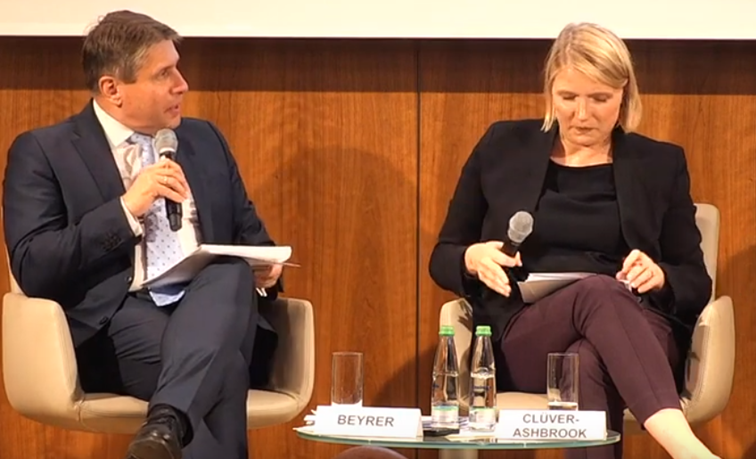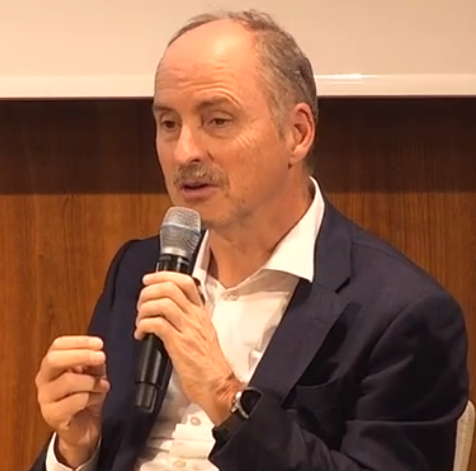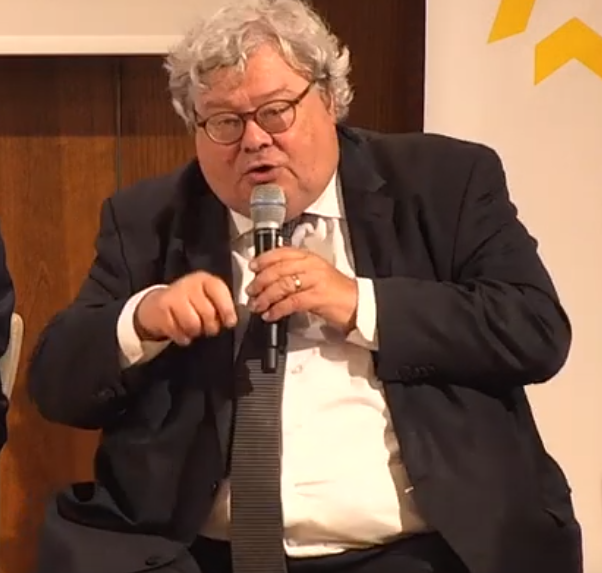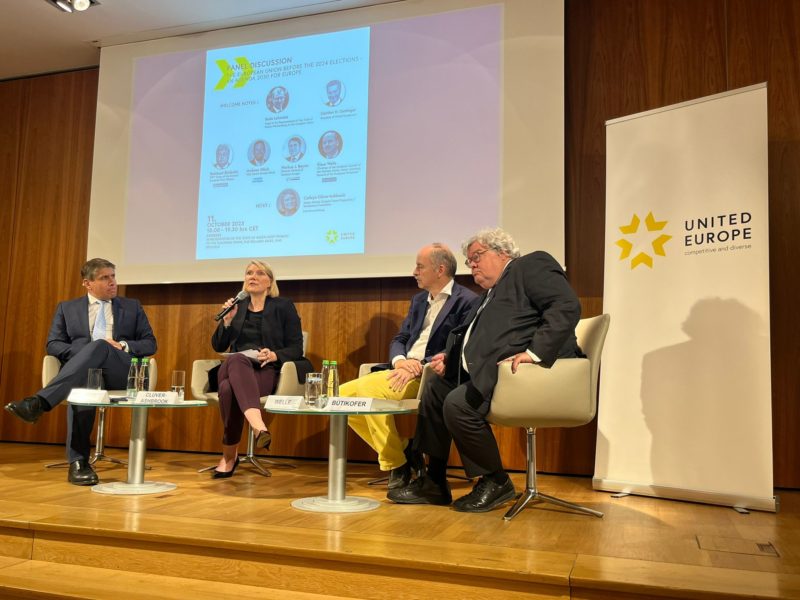On 11 October, United Europe focused on Europe’s current economic competitiveness and the growing wave of right-wing populism. Our panellists began the discourse with an analysis of the geopolitical landscape and then moved on to formulating strategic initiatives to address the looming challenges of deindustrialisation. In his opening remarks, Günther H. Oettinger, President of United Europe, highlighted three key factors that will have a significant impact on the upcoming European elections: security, illegal migration and industrial competitiveness.
Our guests were:
Klaus Welle, Academic Council Chairman of the Martens Centre,
former Secretary-General of the European Parliament
Markus J. Beyrer, Director General of BusinessEurope
Reinhard Bütikofer, MEP, Group of the Greens/European Free Alliance
Host: Cathryn Clüver-Ashbrook, Senior Advisor, Programme Europe’s Future / Bertelsmann Foundation,
Vice President at United Europe.

Cathryn Clüver-Ashbrook, Vice President of United Europe and the moderator of the discussion, emphasized at the outset: “Eight months before the European elections, we find ourselves in a time of geopolitical uncertainties and significant geo-economic challenges. A survey by the Bertelsmann Foundation on September 23, 2023, revealed that 65% of voters were not only concerned but highly worried about the numerous geopolitical crises.”
The Bertelsmann Foundation suggested that these concerns could fuel demagogues, right-wing populists, and enemies of democracy.
Reinhard Bütikofer provided a counterpoint to the prevailing negative sentiment by emphasizing that Europe is indeed on a positive trajectory and should not undermine its potential for constructive growth. Bütikofer highlights the need to avoid confusing European citizens with flawed concepts such as “strategic autonomy”. Europe should not be measured by its capacity for complete independence in security policy, as autonomy is an inappropriate benchmark. Instead, Europe should invest more in strategic cooperation and solidarity with like-minded partners. Bütikofer also brought attention to a range of instruments designed to enhance trade, including the establishment of a new Trade and Technology Council (TTC) between the EU and India. The initiative serves to bolster their strategic partnership and deepen their engagement in the realms of trade and technology.
Klaus Welle concurs with Reinhard Bütikofer’s assessment that Europe has indeed made strides but acknowledges that there is still significant work to be done, particularly in the domain of security. He points out that national exceptions are undermining the internal market for defence products. While the EU budget provides a basic framework for transportation and logistics, substantial increases are imperative. In the case of an attack on a new state, such as the Baltic states, a critical question arises: How can Europe assist? How can we effectively deploy French, Spanish, and German resources to the affected areas? Currently, EU member states are falling short of meeting expectations in the defence sector. Here, the EU must support a range of measures to strengthen the internal market, expand production capacity and research, and prioritize transport, logistics, and the Civil Protection Service in the upcoming budget planning.

Markus Beyrer initiated his remarks on an optimistic note, emphasizing the existence of highly motivated entrepreneurs with a shared vision of elevating Europe into the best place to live, work, and do business. However, he promptly transitioned into a more critical assessment, underscoring the reality that Europe has not yet achieved this lofty ambition. He noted that a considerable number of companies opt to allocate their investments in regions such as Asia, North America, and Mexico rather than within European borders. An annual survey undertaken by BusinessEurope served as a barometer for evaluating Europe’s economic competitiveness. This survey poses questions, such as “Where does Europe currently stand? Are we improving or regressing as a business location compared to our main competitors?” This year’s result indicated that 90% of the organization’s members believed that Europe’s business environment had deteriorated over the past three years. Beyrer elucidated the reasons behind this concerning trend, citing factors like rising energy costs – directly attributable to the conflict in Ukraine, a surfeit of regulatory obligations, resulting in a staggering 5,000 new pages of regulations for businesses in recent years, and the influence of aggressive policies from other parts of the world, exemplified by the Inflation Reduction Act in the United States.
In the second part of the discussion, United Europe sought sustainable strategies to guide Europe safely through these crisis-ridden times. Reinhard Bütikofer, who has opted to not seek re-election for the Green Party, observed that the renowned Clinton phrase, “It’s the economy, stupid,” no longer suffices. In the contemporary landscape, it should be amended to, “It’s geopolitics, stupid.” Bütikofer pointed out one of Europe’s paramount challenges for the next five years: the necessity to present more appealing offers to nations in the global South while lending robust Global Gateway Initiative. For instance, he referenced a meeting between the EU and the African Union at the outset of last year, where Belgium’s Deputy Foreign Minister emerged as the highest-ranking European in the room – a telling reflection of how Europeans are influencing global politics. He emphasized that justice, social equity, and sustainable development have evolved into pivotal geopolitics imperatives. Neglecting action in these domains could potentially lead to these regions becoming strategic reservoirs for China, Russia, and other authoritarian regimes.
The second focal point was Europe’s imperative unification and integration, an issue Bütikofer believes has been procrastinated for far too long. He advocated for a more proactive approach to EU accession for Western Balkan states and expressed the need for greater decisiveness in the context of Ukraine and Moldova, underscoring the urgency of concluding the enlargement process by 2030. “I want to echo what Günther Oettinger said. I rarely agree with Charles Mitchell, but there he was right. 2030 should be our target date for concluding the enlargement”.

Lastly, Bütifofer expounded upon the significance of creating domestic competitiveness and fortifying the internal market. He scrutinized the “Critical Raw Materials Act,” which calls for 40% of processing to occur within Europe. “Instead of playing the nationalist card of restoring, we should play the cooperative card of friend-shoring or ally-shoring!” Bütikofer advocated for helping countries in the global South with resource abundance establish their own processing industries, reducing Europe’s reliance on China and assisting them in their industrialization efforts. “For me, this is the third pillar to strengthen Europe’s competitiveness, not only through subsidy distribution but through rule changes,” concluded Reinhard Bütikofer.
Klaus Welle referenced discussions with young entrepreneurs in the digital sector. Their concerns centred on their ability to initiate business in Europe, but their impediment lay in scaling these enterprises – that is, expanding their revenue without substantial investments. This limitation, Welle highlighted, is attributed to Europe’s absence of a capital market union and a transnational banking system. These deficiencies not only obstruct growth strategies but also exert a considerable impact on the services sector. Welle stressed the necessity of addressing services and industry in conjunction to foster a more robust economic landscape.
Furthermore, Welle contended that sustainability should serve as the guiding principle across all policy areas, extending beyond environmental considerations to encompass sustainable debts, defence strategies as well and policies concerning demographics and democracy. This comprehensive approach, he asserted is indispensable for steering Europe toward enduring prosperity.
We would like to thank our panellists for the interesting discussions and the staff of the Representation of the State of Baden-Württemberg to the European Union in Brussels for their friendly support.
Please find here the recording of the full discussion.



